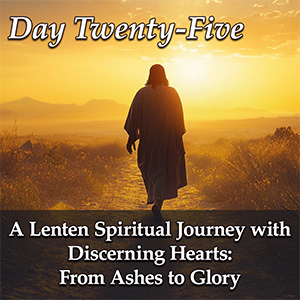Podcast: Play in new window | Download (Duration: 6:15 — 4.4MB) | Embed
Subscribe: Apple Podcasts | Spotify | Amazon Music | Android | Pandora | iHeartRadio | JioSaavn | Podchaser | Gaana | Podcast Index | Email | TuneIn | Deezer | Anghami | RSS | More

A Lenten Spiritual Journey with Discerning Hearts: From Ashes to Glory – Discerning Hearts Podcast
Day 25: “The Greatest Commandment”
Reader:
Scripture Reading:
Mark 12:28–34
One of the scribes came near and heard them disputing with one another, and seeing that Jesus answered them well, he asked Him, “Which commandment is the first of all?” Jesus answered, “The first is, ‘Hear, O Israel: the Lord our God, the Lord is one; you shall love the Lord your God with all your heart, and with all your soul, and with all your mind, and with all your strength.’ The second is this, ‘You shall love your neighbor as yourself.’ There is no other commandment greater than these.”
Reflection:
Today we return again to the foundation of our faith: love of God and love of neighbor. These aren’t vague concepts or lofty aspirations—they are a way of life, lived out daily in real choices. In a world where division, indifference, and isolation often tempt us to retreat inward, Jesus calls us to open our hearts—to love God with everything we are, and to love our neighbor with compassion, intention, and generosity.
Prayer is essential in helping us discern what this love looks like in real time. Contemplative silence, the Examen, and Scripture reflection are the places where we listen. The sacraments, particularly Reconciliation and the Eucharist, give us the grace to act. But it is in action—in stepping into the messiness of human need—that we live the commandments most fully.
Love takes many forms. It may mean checking in on a lonely neighbor, advocating for someone who has no voice, offering forgiveness in a fractured relationship, or being generous with your time for someone in need. Sometimes it’s choosing to be present to your children or spouse when distractions beckon. Other times, it may be supporting those on the margins: the unhoused, the refugee, the isolated. These everyday actions, when rooted in love, become sacred.
Servants of God Catherine Doherty and Dorothy Day, as well as St. Teresa of Calcutta, lived this so powerfully. Each in their own way entered the suffering of others and made a home for them, whether in the streets, in a Catholic Worker house, or in a soup line. Their lives teach us that holiness is not removed from the world’s pain—it goes straight into it, with mercy and justice in hand.
St. Bernard of Clairvaux reminds us:
“True justice is not only in giving what is due, but in giving what is loving. For mercy, when rightly ordered, is justice perfected.”
(On the Song of Songs, Sermon 11)
And the Desert Father Abba Theodore of Pherme offers this challenge:
“If you are truly a brother, be like a column: others will lean on you.”
(Apophthegmata Patrum, Theodore 1)
Love is not always easy. It stretches us. But it is in this stretching that we are made more like Christ. Lent calls us to return to God with our whole heart and to let that returning bear visible fruit in how we care for others—especially those most in need.
And in the words of the Church’s liturgy, may our Lenten renewal send us forth with the strength to “go in peace, glorifying the Lord by your life,” or as we are sometimes reminded, to “go and announce the Gospel of the Lord.” This is not the end of our prayer—it is where our prayer becomes action.
Reflection Questions:
- In what ways are you being called to return to God with your whole heart?
- How do justice and mercy play out in your daily relationships?
- Where can your love grow deeper—toward God, toward others, or even toward yourself?
Closing Prayer:
Lord, You have commanded us to love You with all that we are, and to love our neighbor as ourselves. Help us return to You with sincerity and strength. Cleanse our hearts of anything that divides us from You or from one another. Teach us to live in love that is both just and merciful, and to find joy in serving You in the least of our brothers and sisters.
Amen.
This reflection is written by Kris McGregor of Discerning Hearts®. The Scripture passage is taken from the Jerusalem Bible (1966 edition), used with permission. No unauthorized use or reproduction is permitted without prior written consent.

